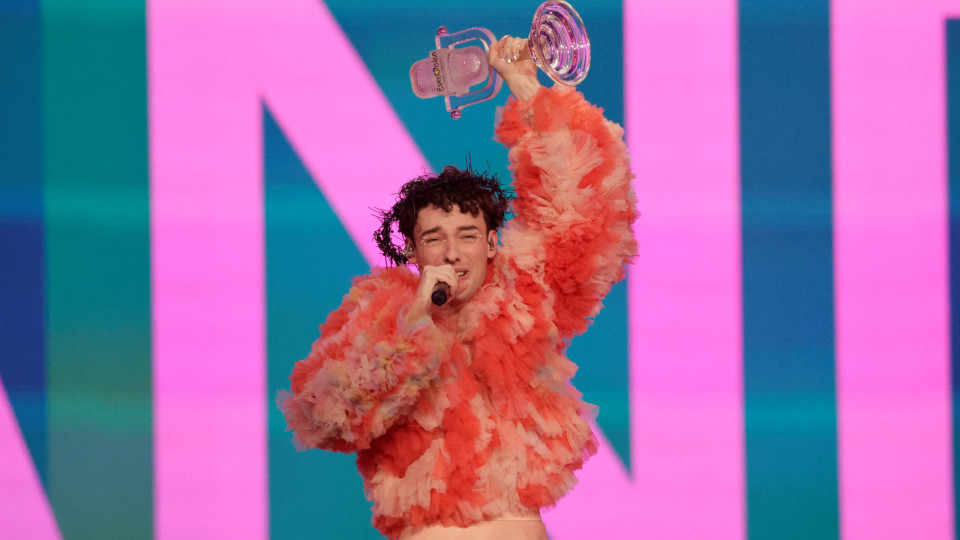The winner, the losers (and the expulsion). The plot of the Eurovision controversy
In Malmö, Sweden, 25 countries competed to win but it was Switzerland, with the voice of the artist Nemo, that won the contest, with 591 points.

© Reuters

Cultura Festival
Eurovision Top 3
In Malmö, Sweden, 25 countries competed to win, but it was Switzerland, with the artist Nemo, that won the contest with 591 points. This was the third time that country has won the festival.
The top 3 of the 68th edition of the Eurovision Song Contest is completed by Croatia, represented by Baby Lasagna, with the song 'Rim Tim Tagi Dim', which received 547 points (210 from the juries and 337 from the public), and Ukraine, represented by Alyona Alyona and Jerri Heil, with 453 points (146 from the juries and 307 from the public), with the song 'Teresa & Maria'.
Ukraine was the second most voted country by the public, being surpassed only by Israel, which obtained 323 points from the public, to which were added 52 points from the international juries.
Portugal came in 10th
Portugal, which was represented by Iolanda, with the song 'Grito', came in 10th place, with 152 points. Despite the jury's score (139 accumulated) being worth 7th place for the vote by country, in the public's preferences, Portugal was left with only 13 points, thus finishing in an honorable place in the overall classification.
The song 'Grito' received points from Ukraine (three), United Kingdom (12), Luxembourg (three), San Marino (five), Malta (one), Croatia (12), Albania (five), Czech Republic (three), Israel (three), Portugal (three), Armenia (10), Slovenia (eight), Georgia (four), Switzerland (seven), Moldova (four), Greece (six), Netherlands (eight), France (12), Belgium (two), Iceland (four), Latvia (one), Ireland (five), Poland (six), Lithuania (eight) and Sweden (four).
Edition marked by controversies
Israel's participation
The event was marked by the Israeli-Palestinian conflict, which has lasted for decades, but intensified after an attack by the Palestinian group Hamas in Israel on October 7, which caused nearly 1,200 deaths, with the country led by Benjamin Netanyahu responding with an offensive that caused more than 34,000 deaths in the Gaza Strip, according to reports from both sides.
Since it was learned that Israel would participate in the contest, represented by Eden Golan, several appeals were made by European political representatives and artists to the European Broadcasting Union (EBU) to veto the country's participation in the contest.
At a press conference after the second semi-final, in which the candidates from Greece, Switzerland and the Netherlands participated, along with the representative from Israel, there were some episodes portrayed by the media, such as when Marina Satti, the representative from Greece, pretended to be sleeping during a speech by the Israeli.
On the same occasion, a Polish journalist asked the Israeli singer about her responsibility for the highest level of terrorist alert that Malmö was experiencing: "By being here, you are a security risk and a danger to everyone! Don't you care?", the Pole asked.
Faced with this question, the moderator of the press conference told Golan that she did not have to answer if she did not want to. "Why not?", Joost Klein, representative of the Netherlands, then intervened aloud, in an episode that quickly went viral on social media.
Already in the final of the festival, during the performance of the Israeli representative, boos and insults were heard inside the Malmö Arena. In addition, according to journalists present at the arena, Eden Golan was also booed during the parade of flags, at the beginning of the ceremony, something that was not noticeable in the television broadcast.
The Israeli spokeswoman who announced the classification given by the jury of that country to the songs in competition was also booed by the audience present at the Malmö Arena.
In the final, a Portuguese representative appeared in the parade of flags wearing a dress from a Palestinian brand, which she had already worn on Sunday, in the parade on the turquoise catwalk (where the representatives of all countries parade, thus marking the beginning of the live shows of the contest), in Malmö.
On the same occasion, Iolanda had her nails painted with the pattern of the 'keffiyeh', a scarf that is a symbol of the Palestinian resistance. At the end of the contest, Iolanda reappeared with her nails painted with the pattern of the 'keffiyeh'. On stage, when she finished her performance, the Portuguese singer said that "peace will prevail".
But Iolanda was not the only one who ended her performance in the final with appeals for peace. Bambie Thung, representing Ireland, said that "love will always triumph over hate", before leaving the stage.
In turn, the French singer Slimane ended his performance with the phrase "united by music for love and peace".
At the same time, while the final of the Eurovision Song Contest was taking place, thousands of people were protesting outside the Malmö Arena against Israel's participation in the contest.
Expulsion of the artist from the Netherlands
A few hours before the final of the 68th Eurovision Song Contest, there were moments of tension in the contest. This is because the EBU confirmed the elimination from the competition of the Dutch representative, Joost Klein, after suspending him from rehearsals on Friday.
According to the EBU, "the Swedish police are investigating a complaint filed by a female member of the production team, following an incident that occurred after Joost Klein's performance in the semi-final on Thursday night".
In the statement released, the EBU stated that it maintains a policy "of zero tolerance for inappropriate behavior at the event" and is "committed to promoting a safe environment for all staff" working on the contest.
Reactions from the other participants
After the representative of the Netherlands, Joost Klein, was disqualified from the festival, Bambie Thug, representative of Ireland, did not participate in the rehearsal for the final due to "a situation" that occurred at the beginning of the session that led to an urgent meeting with the EBU.
"There was a situation while we were waiting to go on stage and participate in the parade of artists, so I asked for the urgent attention of the EBU. The EBU took this matter seriously and we discussed what measures to take", explained, on social media, Bambie Thug, an artist who identifies as non-binary.
However, Ireland was not the only absence in the parade, as the representatives from Greece and Switzerland, Marina Satti and Nemo, also did not take to the stage at that moment of the rehearsal.
This year the contest started with 37 countries and 25 reached the final. There should have been 26, but it ended with one less due to the expulsion of Joost Klein.
In addition to Switzerland, Croatia, Ukraine, Israel and Portugal, the following participated in the final of the 68th Eurovision Song Contest: Sweden, Germany, Luxembourg, Lithuania, Spain, Estonia, Ireland, Latvia, Greece, United Kingdom, Norway, Italy, Serbia, Finland, Armenia, Cyprus, Slovenia, Georgia, France and Austria.
Read also: From Sweden, with love. The images of the 68th edition of Eurovision (Portuguese version)

Descarregue a nossa App gratuita.
Oitavo ano consecutivo Escolha do Consumidor para Imprensa Online e eleito o produto do ano 2024.
* Estudo da e Netsonda, nov. e dez. 2023 produtodoano- pt.com



